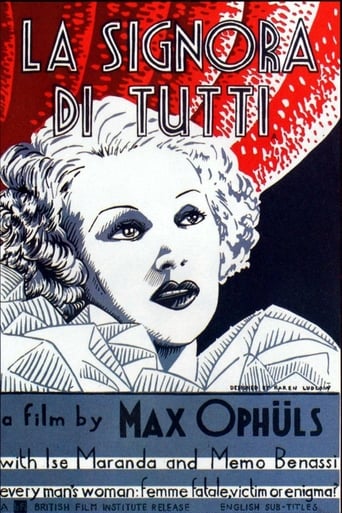happytrigger-64-390517
Max Ophüls directed so many masterpieces with great actor direction in great and sad love stories. All that shot with a virtuoso camera (travellings or real time shots like in "Madame De" or "Letters From An Unknown Woman").All these masterpieces are available. But there is one hidden masterpiece directed by Max Ophüls and it is one of his first movie : "La Signorra Di Tutti", only available in Italy (where it was shot, Ophüls was an international director). And it is an incredible masterpiece with again some virtuoso cinematography and narration (flashbacks in flashbacks). It is a powerful love drama with insane scenes.Sure Orson Welles watched it and provided him so many ideas. And 20 years later, Ophüls directed his most well known movie, "Lola Montès", with the same story.It is urgent to release this hidden treasure for real cinema lovers.
writers_reign
This is a stunning early sound film from Max Ophuls which deservedly won a 'technical' award at Venice. It's difficult to imagine that old Awesome did not include this in the dozens of films he watched before making Kane because Ophuls uses, some seven years earlier, many of the techniques, not least overlapping Sound, that crystallised in Kane. The plot verges on the melodramatic but the Style is something else; flashbacks within flashbacks, lush tracking shots, montages, dissolves, everything in fact from what those academics love to call the 'grammar' of film making is present and correct. A film in 1934 that begins with a wipe of the label on a 78 rpm record and ends on a static shot of the face of the heroine on a poster has to be out of the right bottle and this is vintage. Dix sur dix going away.
genet-1
This overblown romance prefigures such Hollywood melodramas as WRITTEN ON THE WIND, but, like Douglas Sirk's tale of life among the oil aristocracy, is redeemed by technique, in this case Ophuls' spirited use of moving camera. Everyone in the cast chews the curtains with appetite, particularly Isa Miranda as Gaby, the neurasthenic movie star who, following one of her many collapses in the course of the film, re-experiences the key event of her life, an unhappy love affair with married magnate Leonardo which led to the accidental death of his invalid wife, and Gaby's subsequent guilty breakdown. Nobody tracked or craned the camera with more flair than Ophuls, and he uses both techniques expertly in this film, often, it seems, for no motive more weighty than simple glee at his expertise. An insignificant conversation between Gaby in a rowboat on a sun-lit lake and Leonardo driving his convertible along the bank is elaborately staged as two long tracking shots, with Ophuls intercutting between them. Similar flair marks the death of wheelchair-bound Alma, her shadow racing ahead of her along the floor as she pushes her chair to the head of the stairs, then teeters and falls. Other sequences are too spasmodic, in particular those at the film studio, with Gaby's cliché cigar-chewing agent negotiating a new contract with the equally stock studio head, and,later, Leonardo facing a hostile board that attacks him for neglect of the company. Miranda is at her febrile worst in this film, and it demands considerable suspension of disbelief to accept as her married lover the overweight and stolid Memo Benassi, whose primary acting technique is to stare into the middle distance and fire up another cigarette. But any enthusiast for Ophuls' fluid camera will find the film a delight.
Mario Naito
Signora di tutti is truly one of the most underrated films of movie history. When I saw it ten years ago I was marveled about its modernity although belonging to 1934. I´m sure Welles undoubtely watched it before filming Citizen Kane, because Max Ophuls´s narration and editing techniques in that picture somehow anticipated Orson´s landmark screen jewel. This movie deserves a standout place in the development of film language.



